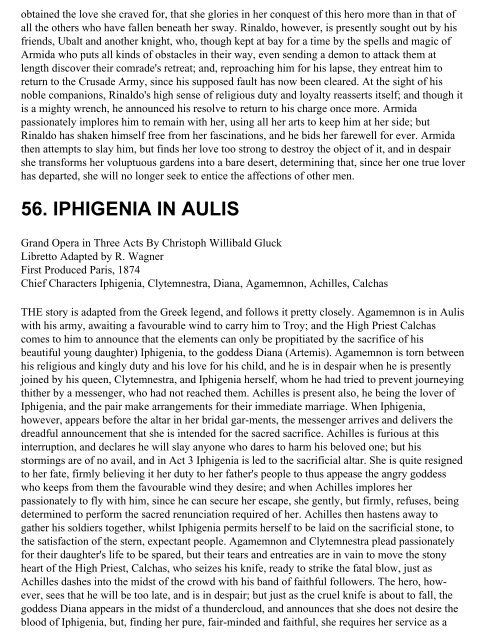Opera Plots I - MDC Faculty Home Pages
Opera Plots I - MDC Faculty Home Pages
Opera Plots I - MDC Faculty Home Pages
Create successful ePaper yourself
Turn your PDF publications into a flip-book with our unique Google optimized e-Paper software.
obtained the love she craved for, that she glories in her conquest of this hero more than in that of<br />
all the others who have fallen beneath her sway. Rinaldo, however, is presently sought out by his<br />
friends, Ubalt and another knight, who, though kept at bay for a time by the spells and magic of<br />
Armida who puts all kinds of obstacles in their way, even sending a demon to attack them at<br />
length discover their comrade's retreat; and, reproaching him for his lapse, they entreat him to<br />
return to the Crusade Army, since his supposed fault has now been cleared. At the sight of his<br />
noble companions, Rinaldo's high sense of religious duty and loyalty reasserts itself; and though it<br />
is a mighty wrench, he announced his resolve to return to his charge once more. Armida<br />
passionately implores him to remain with her, using all her arts to keep him at her side; but<br />
Rinaldo has shaken himself free from her fascinations, and he bids her farewell for ever. Armida<br />
then attempts to slay him, but finds her love too strong to destroy the object of it, and in despair<br />
she transforms her voluptuous gardens into a bare desert, determining that, since her one true lover<br />
has departed, she will no longer seek to entice the affections of other men.<br />
56. IPHIGENIA IN AULIS<br />
Grand <strong>Opera</strong> in Three Acts By Christoph Willibald Gluck<br />
Libretto Adapted by R. Wagner<br />
First Produced Paris, 1874<br />
Chief Characters Iphigenia, Clytemnestra, Diana, Agamemnon, Achilles, Calchas<br />
THE story is adapted from the Greek legend, and follows it pretty closely. Agamemnon is in Aulis<br />
with his army, awaiting a favourable wind to carry him to Troy; and the High Priest Calchas<br />
comes to him to announce that the elements can only be propitiated by the sacrifice of his<br />
beautiful young daughter) Iphigenia, to the goddess Diana (Artemis). Agamemnon is torn between<br />
his religious and kingly duty and his love for his child, and he is in despair when he is presently<br />
joined by his queen, Clytemnestra, and Iphigenia herself, whom he had tried to prevent journeying<br />
thither by a messenger, who had not reached them. Achilles is present also, he being the lover of<br />
Iphigenia, and the pair make arrangements for their immediate marriage. When Iphigenia,<br />
however, appears before the altar in her bridal gar-ments, the messenger arrives and delivers the<br />
dreadful announcement that she is intended for the sacred sacrifice. Achilles is furious at this<br />
interruption, and declares he will slay anyone who dares to harm his beloved one; but his<br />
stormings are of no avail, and in Act 3 Iphigenia is led to the sacrificial altar. She is quite resigned<br />
to her fate, firmly believing it her duty to her father's people to thus appease the angry goddess<br />
who keeps from them the favourable wind they desire; and when Achilles implores her<br />
passionately to fly with him, since he can secure her escape, she gently, but firmly, refuses, being<br />
determined to perform the sacred renunciation required of her. Achilles then hastens away to<br />
gather his soldiers together, whilst Iphigenia permits herself to be laid on the sacrificial stone, to<br />
the satisfaction of the stern, expectant people. Agamemnon and Clytemnestra plead passionately<br />
for their daughter's life to be spared, but their tears and entreaties are in vain to move the stony<br />
heart of the High Priest, Calchas, who seizes his knife, ready to strike the fatal blow, just as<br />
Achilles dashes into the midst of the crowd with his band of faithful followers. The hero, however,<br />
sees that he will be too late, and is in despair; but just as the cruel knife is about to fall, the<br />
goddess Diana appears in the midst of a thundercloud, and announces that she does not desire the<br />
blood of Iphigenia, but, finding her pure, fair-minded and faithful, she requires her service as a













